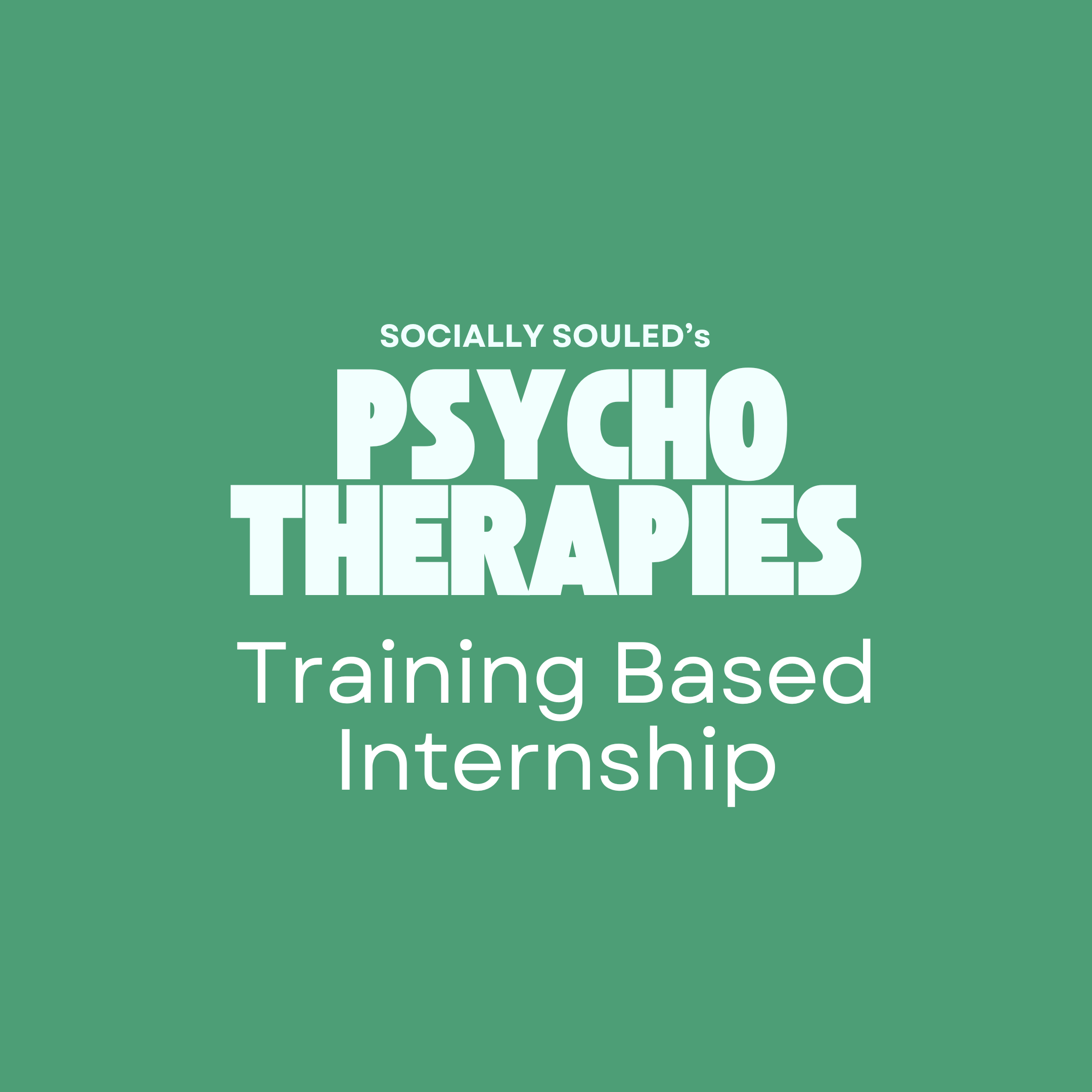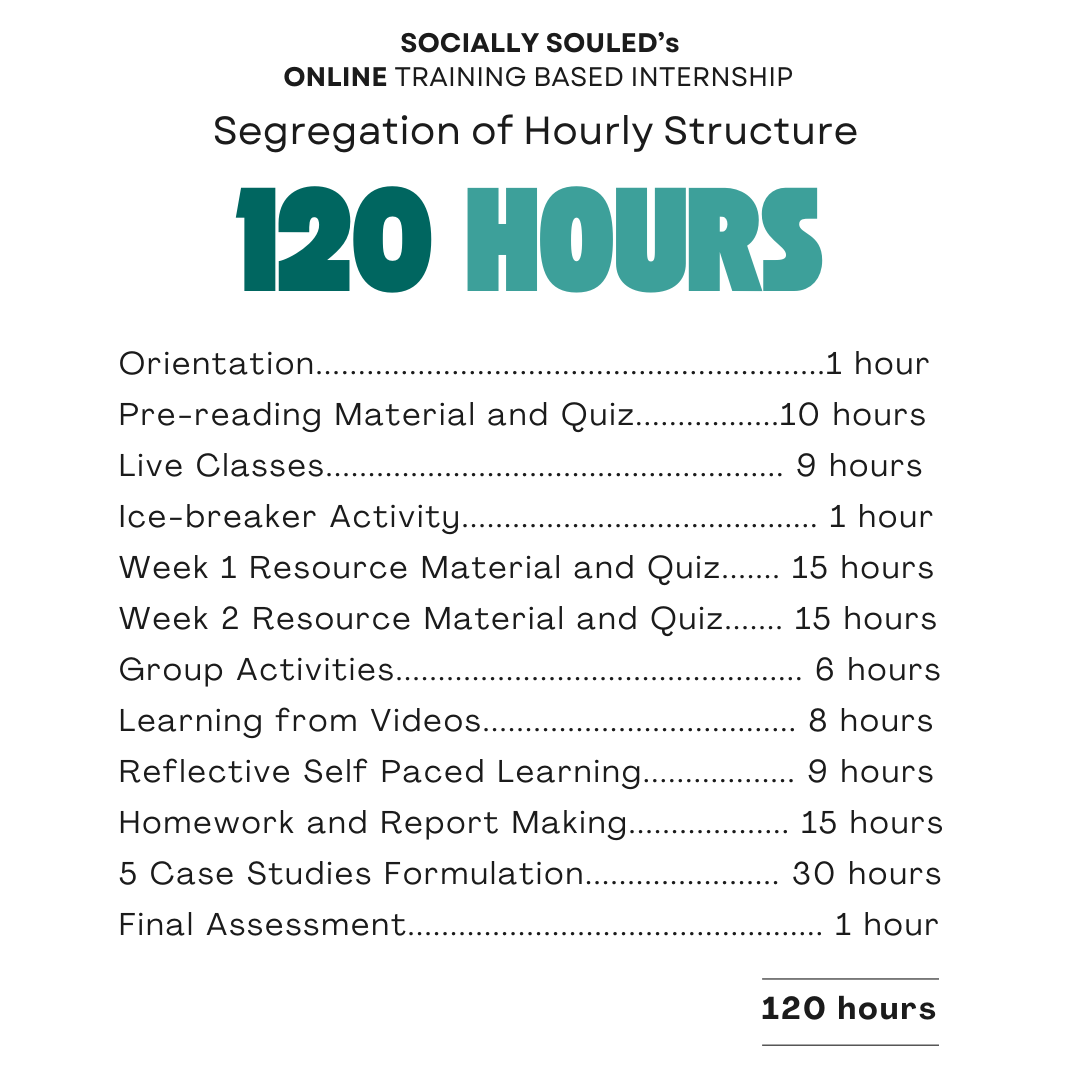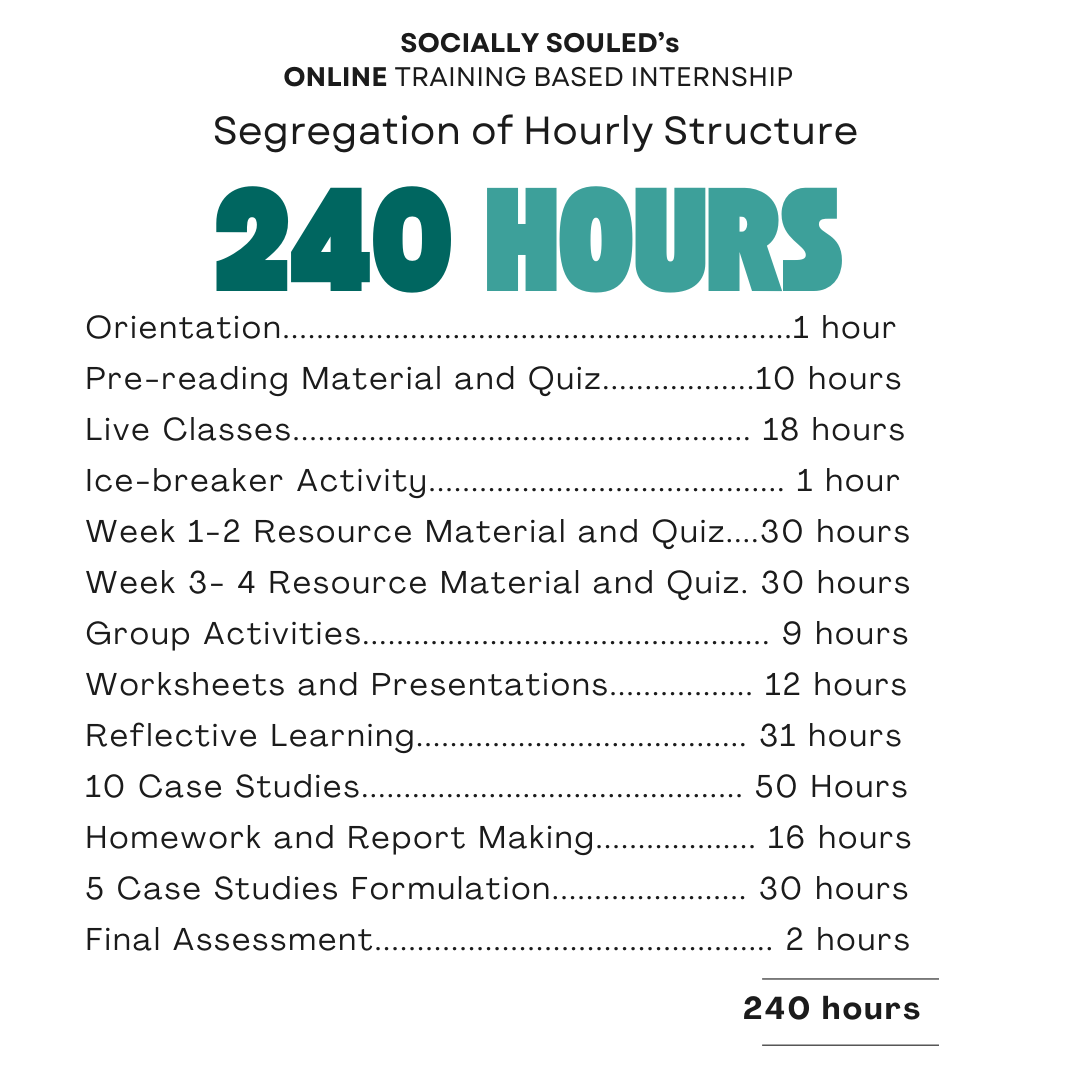

Overview
The Psychotherapies Internship is designed to provide students and early-career professionals with a practical and immersive introduction to diverse therapeutic approaches. This program bridges theory and application, helping interns gain exposure to multiple schools of psychotherapy, understand their core techniques, and practice case-based application in a supervised learning environment.
120 hours
-
- Basics of Psychotherapy: Definition and Scope
- Ethical Guidelines and Professional Boundaries
- Introduction to Different Therapeutic Approaches
- Basics of Psychotherapy: Definition and Scope
-
- Establishing Rapport and Trust
- Building the Therapeutic Alliance
- Introduction to Core Counselling Skills:
- Active Listening
- Empathy
- Unconditional Positive Regard
- Establishing Rapport and Trust
-
- CBT Model: Understanding the Relationship Between Thoughts, Emotions, and Behaviours
- Introduction to the Cognitive Triad
- Identifying Cognitive Distortions
- CBT Model: Understanding the Relationship Between Thoughts, Emotions, and Behaviours
-
- Introduction to CBT Techniques:
- Thought Records
- Behavioral Activation
- Introduction to CBT Techniques:
-
- Benefits and Challenges of Group Therapy
- Stages of Group Development (Forming, Storming, Norming, Performing, Adjourning)
- Benefits and Challenges of Group Therapy
-
- What is Psychodrama?
- Techniques:
- Role Reversal
- Mirroring
- What is Psychodrama?
240 hours
-
Everything covered in 120 hours+ the topics given below
-
- Core Conditions of Therapy: Empathy, Unconditional Positive Regard, Congruence
- Concept of Self: Real Self vs Ideal Self and Incongruence
- Core Conditions of Therapy: Empathy, Unconditional Positive Regard, Congruence
-
- The Actualizing Tendency and Self-Actualization
- Non-Directive Approach and Active Listening Techniques
- The Actualizing Tendency and Self-Actualization
-
- Introduction to Hypnosis and States of Consciousness
- Myths and Misconceptions about Hypnotherapy
- Introduction to Hypnosis and States of Consciousness
-
- Suggestibility and Induction Techniques:
- Eye Roll Test
- Relaxation Methods (JPMR)
- Applications in Anxiety, Phobias, and Habit Cessation
- Suggestibility and Induction Techniques:
-
- Focus on Here-and-Now Awareness
- Unfinished Business and Emotional Closure
- Use of Experiments and Creative Techniques:
- Empty Chair Technique
- Focus on Here-and-Now Awareness
-
- Emphasis on Personal Responsibility and Choice
- Practical Activity: Peer Roleplays Practicing Gestalt Techniques
- Internship Reflections, Case Presentations, and Feedback
- Certificate Distribution
- Emphasis on Personal Responsibility and Choice

Ms Shivika Chadha : Psychotherapist and Educator at Socially Souled
Evaluation Parameters - Attending review meeting is mandatory
- Attendance - 5 marks
- Class Participation - 15 marks
- Class assignments and activities - 30 marks
- Viva/ Quiz- 10 marks
- Written assessment/ Report making- 40 marks
-

Beginner to Intermediate Level
Choose the 120-hour program if you're new to psychology, currently in high school, or in your first year of a bachelor’s degree and want to build a strong foundation in the field. -

Advanced Level
Choose the 240-hour program if you're pursuing a bachelor’s or master’s in psychology and want an in-depth experience—this program includes everything from the 120-hour course and much more.
Perks
This programme is suitable if:
Why Choose Our Training?
Comprehensive Learning: From foundational knowledge to specialized insights, our curriculum equips you with a well-rounded understanding of neuro psychology.
Innovative Approach: Blend theoretical knowledge with practical applications, engage in cutting-edge research, and learn from real case studies.
Personalized Experience: Benefit from a small cohort size, individualized mentorship, and customized learning paths that align with your career goals.
Professional Network: Connect with industry experts, fellow interns, and alumni, fostering a community of professionals committed to advancing mental health care.
Frequently Asked Questions (FAQs)
-
The Psychotherapies Internship will encompass exposure to a range of therapeutic approaches such as CBT, DBT, Psychodynamic Therapy, Person-Centred Therapy, ACT, Gestalt, and Art Therapy, along with hands-on practice through case studies, role-plays, and reflective assignments.
-
Ideal for psychology students, budding therapists, mental health practitioners, or anyone seeking hands-on psychology experience.
-
The Psychotherapies Internship equips participants with hands-on skills in case formulation, therapy session structuring, and applying evidence-based techniques from CBT, DBT, ACT, Psychodynamic, Gestalt, and Art Therapy. By the end of the program, interns gain practical competence in therapeutic communication, intervention planning, and ethical practice, preparing them for real-world counselling contexts.
-
Yes, the internship includes live sessions, case studies, evaluations, and mock sessions with seasoned psychologists and educators.
-
The combination of theoretical knowledge, practical application, and professional mentorship equips you to excel in the field of psychology, with placement assistance as per eligibility.
-
Participants will benefit from receiving an internship certificate, weekly assessments, practical learning, evaluation reports, and more
-
This course will help you boost your profile by blending two niches in psychology, to give you a wider perspective. Moreover, you can also use the placement nurturance service and get personalised guidance from the experts.
-
Yes, you will receive a certificate.


